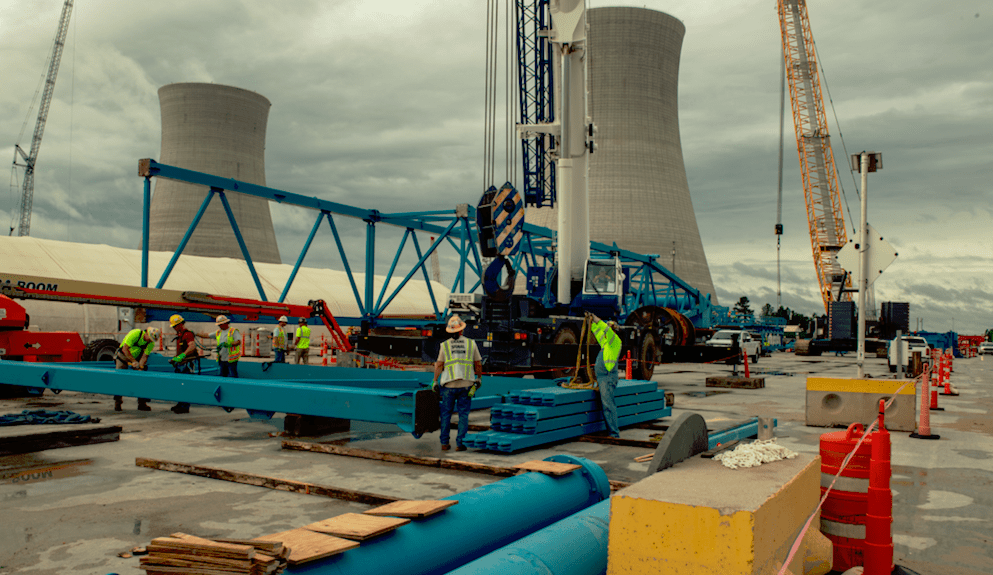The post NRC Cites Problems at Vogtle, May Increase Project Oversight appeared first on POWER Magazine.

Continuing issues with the two-unit expansion of the Vogtle nuclear power plant in Georgia have led federal regulators to say they are considering increasing oversight of the project. The U.S. Nuclear Regulatory Commission (NRC) on Aug. 26, in a letter to Southern Nuclear, which is leading the project along with its sister company Georgia Power, released its findings from an inspection conducted earlier this summer, with the agency reporting problems that could threaten the plant’s operation.
The Plant Vogtle project has been beset by numerous delays over the past several years, and is billions of dollars over budget. The NRC said its inspection came after Georgia Power earlier this year disclosed quality control issues with the expansion.
The NRC said it uncovered problems with electrical cables and systems that it said were apparently not installed correctly, including in some cases installed too close together. The agency said those installations increase the risk of fire that could knock out redundant safety-related equipment. The NRC said those cables were related to reactor coolant pumps, along with equipment designed to safely shut down the nuclear reactor.
The agency also said that workers at Vogtle knew of the problems but didn’t report them as part of a system designed to handle such issues. Because of that, and with the issues not resolved, work continued and contributed to further problems.
The NRC report characterized the issues as apparent violations of federal requirements, and said it could lead the agency to increase its oversight of the project. The NRC said it would issue “our final significance determination and enforcement decision, in writing, within 90 days” from the Aug. 26 issue of its letter.
Additional Oversight
John Kraft, a spokesman for Georgia Power, said Southern Nuclear is reviewing the report. Kraft in an email to media wrote, “We welcome additional oversight and are in line with NRC’s recommendations to ensure we meet our number one objective—to bring these units online safely and reliably.” Kraft wrote that Georgia Power doesn’t think more oversight will have an impact on the project’s timeline, or its costs.
Kraft said “many of these issues” already had been reported to the NRC, with work to fix the problems undeerway over the past several months. The NRC has not released information about what the agency’s increased surveillance could include.
The nuclear agency uses a color-coded system to identify its inspection findings, ranging from low-level issues to items of greater significance. It rated as “white” the failure to promptly identify continued cable separation problems, including “widespread deficiencies in installation of seismic supports and structural components,” and a failure to make timely corrections. A “greater than green” rating was preliminarily assigned to the failure to maintain proper separation of electrical equipment.
The NRC in its report said the agency “has determined that the apparent nonconformances associated with the two AVs [apparent violations] do not represent an immediate safety concern because VEGP Units 3 and 4 are currently under construction; there is no fuel in the reactor; and the cable separation issues implicating compliance with inspections, tests, analyses, and acceptance criteria [ITAACs] must be resolved prior to the 10 CFR 52.103(g) finding, after which the licensee is allowed to load nuclear fuel into the reactor.”
Startup Dates Pushed Back
The startup dates for Unit 3 and Unit 4 at Vogtle have been pushed back several times. There have been a handful of contractor changes during the decade-long construction period—Bechtel is now the lead contractor—which also have contributed to delays. The current timelines call for in-service dates in the second quarter of 2022 for Unit 3, and the first quarter of 2023 for Unit 4.
Tom Fanning, CEO of Southern Co., reported during the company’s earnings call on July 29 that hot functional testing had been completed on Vogtle Unit 3, and that the “next and final major milestone” is fuel load. “We project fuel load to occur sometime near year-end 2021 or early in 2022,” he said.
The Vogtle nuclear power plant expansion project includes the addition of two new Westinghouse AP1000 reactors at the site near Waynesboro, Georgia. Plant Vogtle has two existing reactors; Unit 1 began operation in 1987, with Unit 2 coming online in 1989. The project is owned by four partners—Southern Co. subsidiary Georgia Power (45.7%), Oglethorpe Power Corp. (30%), Municipal Electric Authority of Georgia (MEAG Power, 22.7%), and Dalton Utilities (1.6%).
Oglethorpe CEO Michael Smith in an investor briefing on Aug. 26 said his company is expecting commercial operation dates of June 2022 and June 2023 for Units 3 and 4, respectively. Smith in the briefing cited Bechtel and Southern Nuclear’s “more aggressive” target dates; he said his company “decided to add in an extra layer of conservatism” to both its expected commercial operation dates and budget allocation for the project.
The units at Vogtle are the first major new commercial nuclear reactors built in the United States in the past 30 years.
Southern Co. in July said its share of the project’s costs had increased by almost half a billion dollars, as delays have piled up. The first of the two new reactors originally was expected to be operational in 2016.
—Darrell Proctor is a senior associate editor for POWER (@POWERmagazine).
The post NRC Cites Problems at Vogtle, May Increase Project Oversight appeared first on POWER Magazine.